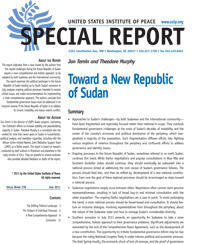 |
| Source: USIP website. |
These efforts overlook fundamental governance challenges at the root of Sudan’s decades of instability and the center of the country’s economic and political dominance of the periphery. Sudanese negotiations tend to occur among elites and cannot claim to represent the population generally. There should be a more inclusive dialogue.
The authors make the critical point that any reform of northern governance should be led by Sudanese. Perceptions that external actors are forcing change can be counterproductive. The international community can support a reform process but should tread carefully. Incremental efforts should focus on promoting an enabling environment in which nascent Sudanese-led efforts can take root and grow.
It will be difficult, however, for the international community to support an national process because it already supports several regional processes.



